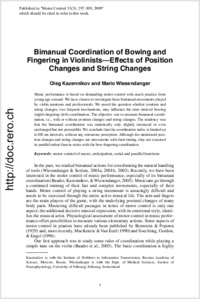Bimanual Coordination of Bowing and Fingering in Violinists—Effects of Position Changes and String Changes
- Kazennikov, Oleg V. Institute of Problems in Information Transmission, Russian Academy of Science, Moscow, Russia
- Wiesendanger, Mario Medicine Department, University of Fribourg, Switzerland
-
2009
Published in:
- Motor Control. - 2009, vol. 13, no. 3, p. 297-309
English
Music performance is based on demanding motor control with much practice from young age onward. We have chosen to investigate basic bimanual movements played by violin amateurs and professionals. We posed the question whether position and string changes, two frequent mechanisms, may influence the time interval bowing (right)-fingering (left) coordination. The objective was to measure bimanual coordination, i.e., with or without position changes and string changes. The tendency was that the bimanual coordination was statistically only slightly increased or even unchanged but not perceptible. We conclude that the coordination index is limited up to100 ms intervals, without any erroneous perception. Although the mentioned position changes and string changes are movements with their timing, they are executed in parallel rather than in series with the bow-fingering coordination.
- Faculty
- Faculté des sciences et de médecine
- Department
- Département de Médecine
- Language
-
- English
- Classification
- Biological sciences
- License
-
License undefined
- Identifiers
-
- RERO DOC 17434
- DOI 10.1123/mcj.13.3.297
- Persistent URL
- https://folia.unifr.ch/unifr/documents/301523
Statistics
Document views: 102
File downloads:
- pdf: 239
